- Home
- Margaret Atwood
The Testaments Page 2
The Testaments Read online
Page 2
“No, my dearest, you were already too big for that. If I had carried you I would have coughed, and then the witches would have heard us.” I could see this was true: she did cough quite a lot. “So I took you by the hand, and we crept out of the castle so the witches wouldn’t hear us. We both said Shh, shh”—here she would hold her finger up to her lips, and I would hold my finger up too and say Shh, shh delightedly—“and then we had to run very fast through the forest, to get away from the wicked witches, because one of them had seen us going out the door. We ran, and then we hid in a hollow tree. It was very dangerous!”
I did have a hazy memory of running through a forest with someone holding my hand. Had I hidden in a hollow tree? It seemed to me that I had hidden somewhere. So maybe it was true.
“And then what happened?” I would ask.
“And then I brought you to this beautiful house. Aren’t you happy here? You are so cherished, by all of us! Aren’t we both lucky that I chose you?”
I would be nestled close to her, with her arm around me and my head against her thin body, through which I could feel her bumpy ribs. My ear would be pressed to her chest, and I could hear her heart hammering away inside her—faster and faster, it seemed to me, as she waited for me to say something. I knew my answer had power: I could make her smile, or not.
What could I say but yes and yes? Yes, I was happy. Yes, I was lucky. Anyway it was true.
3
How old was I at that time? Perhaps six or seven. It’s hard for me to know, as I have no clear memories before that time.
I loved Tabitha very much. She was beautiful although so thin, and she would spend hours playing with me. We had a dollhouse that was like our own house, with a living room and a dining room and a big kitchen for the Marthas, and a father’s study with a desk and bookshelves. All the little pretend books on the shelves were blank. I asked why there was nothing inside them—I had a dim feeling that there were supposed to be marks on those pages—and my mother said that books were decorations, like vases of flowers.
What a lot of lies she had to tell for my sake! To keep me safe! But she was up to it. She had a very inventive mind.
We had lovely big bedrooms on the second floor of the dollhouse, with curtains and wallpaper and pictures—nice pictures, fruit and flowers—and smaller bedrooms on the third floor, and five bathrooms in all, though one was a powder room—Why was it called that? What was “powder”?—and a cellar with supplies.
We had all the dolls for the dollhouse that you might need: a mother doll in the blue dress of the Commanders’ Wives, a little girl doll with three dresses—pink, white, and plum, just like mine—three Martha dolls in dull green with aprons, a Guardian of the Faith with a cap to drive the car and mow the lawn, two Angels to stand at the gate with their miniature plastic guns so nobody could get in and hurt us, and a father doll in his crisp Commander’s uniform. He never said much, but he paced around a lot and sat at the end of the dining table, and the Marthas brought him things on trays, and then he would go into his study and close the door.
In this, the Commander doll was like my own father, Commander Kyle, who would smile at me and ask if I had been good, and then vanish. The difference was that I could see what the Commander doll was doing inside his study, which was sitting at his desk with his Computalk and a stack of papers, but with my real-life father I couldn’t know that: going into my father’s study was forbidden.
What my father was doing in there was said to be very important—the important things that men did, too important for females to meddle with because they had smaller brains that were incapable of thinking large thoughts, according to Aunt Vidala, who taught us Religion. It would be like trying to teach a cat to crochet, said Aunt Estée, who taught us Crafts, and that would make us laugh, because how ridiculous! Cats didn’t even have fingers!
So men had something in their heads that was like fingers, only a sort of fingers girls did not have. And that explained everything, said Aunt Vidala, and we will have no more questions about it. Her mouth clicked shut, locking in the other words that might have been said. I knew there must be other words, for even then the notion about the cats did not seem right. Cats did not want to crochet. And we were not cats.
Forbidden things are open to the imagination. That was why Eve ate the Apple of Knowledge, said Aunt Vidala: too much imagination. So it was better not to know some things. Otherwise your petals would get scattered.
* * *
—
In the dollhouse boxed set, there was a Handmaid doll with a red dress and a bulgy tummy and a white hat that hid her face, though my mother said we didn’t need a Handmaid in our house because we already had me, and people shouldn’t be greedy and want more than one little girl. So we wrapped the Handmaid up in tissue paper, and Tabitha said that I could give her away later to some other little girl who didn’t have such a lovely dollhouse and could make good use of the Handmaid doll.
I was happy to put the Handmaid away in the box because the real Handmaids made me nervous. We would pass them on our school outings, when we’d walk in a long double line with an Aunt at each end of it. The outings were to churches, or else to parks where we might play circle games or look at ducks in a pond. Later we would be allowed to go to Salvagings and Prayvaganzas in our white dresses and veils to see people being hanged or married, but we weren’t mature enough for that yet, said Aunt Estée.
There were swings in one of the parks, but because of our skirts, which might be blown up by the wind and then looked into, we were not to think of taking such a liberty as a swing. Only boys could taste that freedom; only they could swoop and soar; only they could be airborne.
I have still never been on a swing. It remains one of my wishes.
* * *
—
As we marched along the street, the Handmaids would be walking two by two with their shopping baskets. They would not look at us, or not much, or not directly, and we were not supposed to look at them because it was rude to stare at them, said Aunt Estée, just as it was rude to stare at cripples or anyone else who was different. We were not allowed to ask questions about the Handmaids either.
“You’ll learn about all of that when you’re old enough,” Aunt Vidala would say. All of that: the Handmaids were part of all of that. Something bad, then; something damaging, or something damaged, which might be the same thing. Had the Handmaids once been like us, white and pink and plum? Had they been careless, had they allowed some alluring part of themselves to show?
You couldn’t see very much of them now. You couldn’t even see their faces because of those white hats they wore. They all looked the same.
In our dollhouse at home there was an Aunt doll, although she didn’t really belong in a house, she belonged in a school, or else at Ardua Hall, where the Aunts were said to live. When I was playing with the dollhouse by myself, I used to lock the Aunt doll in the cellar, which was not kind of me. She would pound and pound on the cellar door and scream, “Let me out,” but the little girl doll and the Martha doll who’d helped her would pay no attention, and sometimes they would laugh.
I don’t feel pleased with myself while recording this cruelty, even though it was only a cruelty to a doll. It’s a vengeful side of my nature that I am sorry to say I have failed to subdue entirely. But in an account such as this, it is better to be scrupulous about your faults, as about all your other actions. Otherwise no one will understand why you made the decisions that you made.
* * *
—
It was Tabitha who taught me to be honest with myself, which is somewhat ironic in view of the lies she told me. To be fair, she probably was honest when it came to herself. She tried—I believe—to be as good a person as was possible, under the circumstances.
Each night, after telling me a story, she would tuck me into bed with my favourite stuffed animal, which was a whale—be
cause God made whales to play in the sea, so it was all right for a whale to be something you could play with—and then we would pray.
The prayer was in the form of a song, which we would sing together:
Now I lay me down to sleep,
I pray the Lord my soul to keep;
If I die before I wake,
I pray the Lord my soul to take.
Four angels standing round my bed,
Two to feet and two to head;
One to watch and one to pray,
And two to carry my soul away.
Tabitha had a beautiful voice, like a silver flute. Every now and then, at night when I am drifting off to sleep, I can almost hear her singing.
There were a couple of things about this song that bothered me. First of all, the angels. I knew they were supposed to be the kind of angels with white nightgowns and feathers, but that was not how I pictured them. I pictured them as our kind of Angels: men in black uniforms with cloth wings sewn onto their outfits, and guns. I did not like the thought of four Angels with guns standing around my bed as I slept, because they were men after all, so what about the parts of me that might stick out from under the blankets? My feet, for instance. Wouldn’t that inflame their urges? It would, there was no way around it. So the four Angels were not a restful thought.
Also, it was not encouraging to pray about dying in your sleep. I did not think I would, but what if I did? And what was my soul like—that thing the angels would carry away? Tabitha said it was the spirit part and did not die when your body did, which was supposed to be a cheerful idea.
But what did it look like, my soul? I pictured it as just like me, only much smaller: as small as the little girl doll in my dollhouse. It was inside me, so maybe it was the same thing as the invaluable treasure that Aunt Vidala said we had to guard so carefully. You could lose your soul, said Aunt Vidala, blowing her nose, in which case it would topple over the verge and hurtle down and endlessly down, and catch on fire, just like the goatish men. This was a thing I very much wished to avoid.
4
At the beginning of the next period I am about to describe, I must have been eight at first, or possibly nine. I can remember these events but not my exact age. It’s hard to remember calendar dates, especially since we did not have calendars. But I will continue on in the best way I can.
My name at that time was Agnes Jemima. Agnes meant “lamb,” said my mother, Tabitha. She would say a poem:
Little lamb, who made thee?
Dost thou know who made thee?
There was more of this, but I have forgotten it.
As for Jemima, that name came from a story in the Bible. Jemima was a very special little girl because her father, Job, was sent bad luck by God as part of a test, and the worst part of it was that all Job’s children were killed. All his sons, all his daughters: killed! It sent shudders through me every time I heard about it. It must have been terrible, what Job felt when he was told that news.
But Job passed the test, and God gave him some other children—several sons, and also three daughters—so then he was happy again. And Jemima was one of those daughters. “God gave her to Job, just as God gave you to me,” said my mother.
“Did you have bad luck? Before you chose me?”
“Yes, I did,” she said, smiling.
“Did you pass the test?”
“I must have,” said my mother. “Or I wouldn’t have been able to choose a wonderful daughter like you.”
I was pleased with this story. It was only later that I pondered it: how could Job have allowed God to fob off a batch of new children on him and expect him to pretend that the dead ones no longer mattered?
* * *
—
When I wasn’t at school or with my mother—and I was with my mother less and less, because more and more she would be upstairs lying down on her bed, doing what the Marthas called “resting”—I liked to be in the kitchen, watching the Marthas make the bread and the cookies and pies and cakes and soups and stews. All the Marthas were known as Martha because that’s what they were, and they all wore the same kind of clothing, but each one of them had a first name too. Ours were Vera, Rosa, and Zilla; we had three Marthas because my father was so important. Zilla was my favourite because she spoke very softly, whereas Vera had a harsh voice and Rosa had a scowl. It wasn’t her fault though, it was just the way her face was made. She was older than the other two.
“Can I help?” I would ask our Marthas. Then they would give me scraps of bread dough to play with, and I would make a man out of dough, and they would bake it in the oven with whatever else they were baking. I always made dough men, I never made dough women, because after they were baked I would eat them, and that made me feel I had a secret power over men. It was becoming clear to me that, despite the urges Aunt Vidala said I aroused in them, I had no power over them otherwise.
“Can I make the bread from scratch?” I asked one day when Zilla was getting out the bowl to start mixing. I’d watched them do it so often that I was convinced I knew how.
“You don’t need to bother with that,” said Rosa, scowling more than usual.
“Why?” I said.
Vera laughed her harsh laugh. “You’ll have Marthas to do all of that for you,” she said. “Once they’ve picked out a nice fat husband for you.”
“He won’t be fat.” I didn’t want a fat husband.
“Of course not. It’s just an expression,” said Zilla.
“You won’t have to do the shopping either,” said Rosa. “Your Martha will do that. Or else a Handmaid, supposing you need one.”
“She may not need one,” said Vera. “Considering who her mother—”
“Don’t say that,” said Zilla.
“What?” I said. “What about my mother?” I knew there was a secret about my mother—it had to do with the way they said resting—and it frightened me.
“Just that your mother could have her own baby,” said Zilla soothingly, “so I’m sure you can too. You’d like to have a baby, wouldn’t you, dear?”
“Yes,” I said, “but I don’t want a husband. I think they’re disgusting.” The three of them laughed.
“Not all of them,” said Zilla. “Your father is a husband.” There was nothing I could say about that.
“They’ll make sure it’s a nice one,” said Rosa. “It won’t be just any old husband.”
“They have their pride to keep up,” said Vera. “They won’t marry you down, that’s for sure.”
I didn’t want to think about husbands any longer. “But what if I want to?” I said. “Make the bread?” My feelings were hurt: it was as if they were closing a circle around themselves, keeping me out. “What if I want to make the bread myself?”
“Well, of course, your Marthas would have to let you do that,” said Zilla. “You’d be the mistress of the household. But they’d look down on you for it. And they’d feel you were taking their rightful positions away from them. The things they know best how to do. You wouldn’t want them to feel that about you, would you, dear?”
“Your husband wouldn’t like it either,” said Vera with another of her harsh laughs. “It’s bad for the hands. Look at mine!” She held them out: her fingers were knobby, the skin was rough, the nails short, with ragged cuticles—not at all like my mother’s slender and elegant hands, with their magic ring. “Rough work—it’s all bad for the hands. He won’t want you smelling of bread dough.”
“Or bleach,” said Rosa. “From scrubbing.”
“He’ll want you to stick to the embroidery and such,” said Vera.
“The petit point,” said Rosa. There was derision in her voice.
Embroidery was not my strong suit. I was always being criticized for loose and sloppy stitches. “I hate petit point. I want to make bread.”
“We can’
t always do what we want,” said Zilla gently. “Even you.”
“And sometimes we have to do what we hate,” said Vera. “Even you.”
“Don’t let me, then!” I said. “You’re being mean!” And I ran out of the kitchen.
By this time I was crying. Although I’d been told not to disturb my mother, I crept upstairs and into her room. She was under her lovely white coverlet with blue flowers. Her eyes were closed but she must have heard me because she opened them. Every time I saw her, those eyes looked larger and more luminous.
“What is it, my pet?” she said.
I crawled under the coverlet and snuggled up against her. She was very warm.
“It’s not fair,” I sobbed. “I don’t want to get married! Why do I have to?”
She didn’t say Because it’s your duty, the way Aunt Vidala would have, or You’ll want to when the time comes, which was what Aunt Estée would say. She didn’t say anything at first. Instead she hugged me and stroked my hair.
“Remember how I chose you,” she said, “out of all the others.”
But I was old enough now to disbelieve the choosing story: the locked castle, the magic ring, the wicked witches, the running away. “That’s only a fairy tale,” I said. “I came out of your stomach, just like other babies.” She did not affirm this. She said nothing. For some reason this was frightening to me.
“I did! Didn’t I?” I asked. “Shunammite told me. At school. About stomachs.”
My mother hugged me tighter. “Whatever happens,” she said after a while, “I want you to always remember that I have loved you very much.”
5
You have probably guessed what I am going to tell you next, and it is not at all happy.
My mother was dying. Everyone knew, except me.

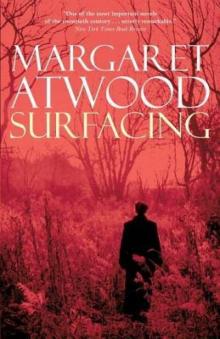 Surfacing
Surfacing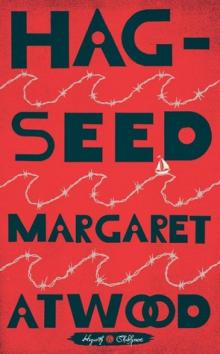 Hag-Seed
Hag-Seed Oryx and Crake
Oryx and Crake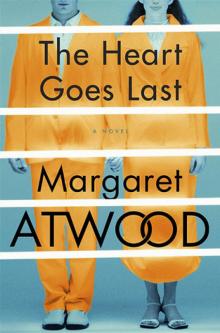 The Heart Goes Last
The Heart Goes Last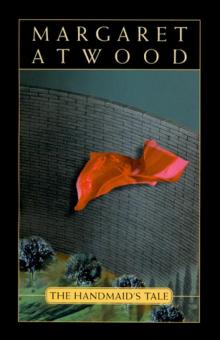 The Handmaid's Tale
The Handmaid's Tale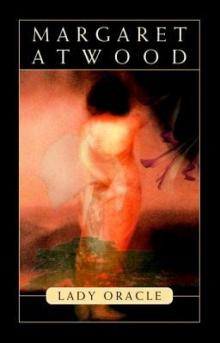 Lady Oracle
Lady Oracle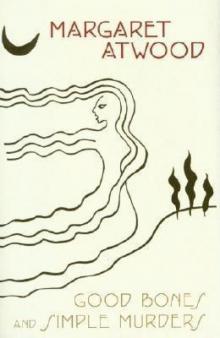 Good Bones and Simple Murders
Good Bones and Simple Murders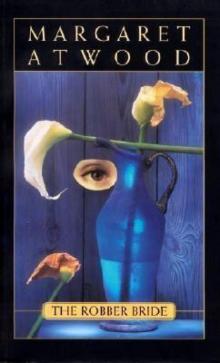 The Robber Bride
The Robber Bride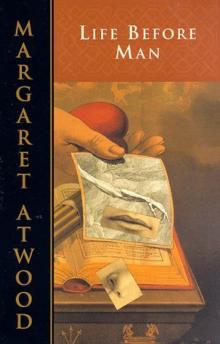 Life Before Man
Life Before Man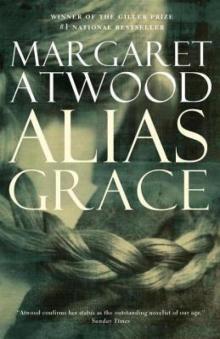 Alias Grace
Alias Grace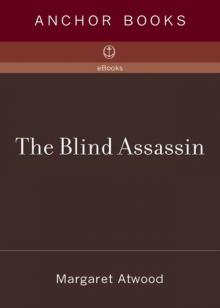 The Blind Assassin
The Blind Assassin Cat's Eye
Cat's Eye The Testaments
The Testaments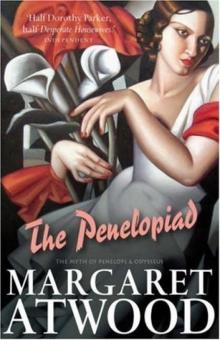 The Penelopiad
The Penelopiad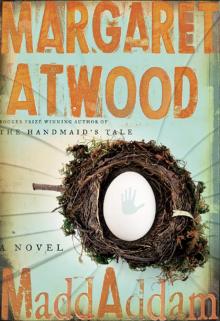 MaddAddam
MaddAddam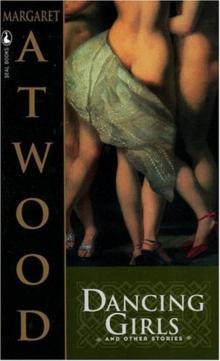 Dancing Girls & Other Stories
Dancing Girls & Other Stories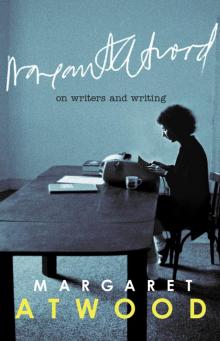 On Writers and Writing
On Writers and Writing Selected Poems II (1976-1986)
Selected Poems II (1976-1986)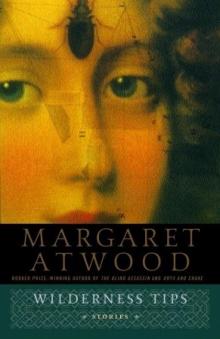 Wilderness Tips
Wilderness Tips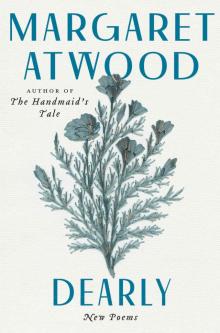 Dearly
Dearly The Tent
The Tent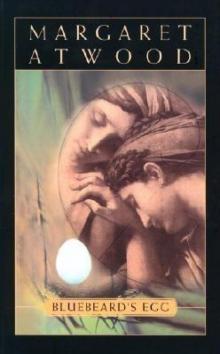 Bluebeard's Egg
Bluebeard's Egg The Edible Woman
The Edible Woman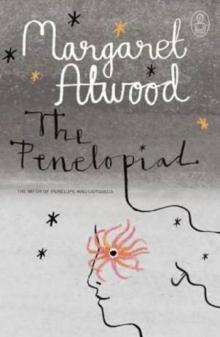 The Penelopiad: The Myth of Penelope and Odysseus
The Penelopiad: The Myth of Penelope and Odysseus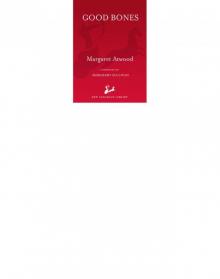 Good Bones
Good Bones I Dream of Zenia with the Bright Red Teeth
I Dream of Zenia with the Bright Red Teeth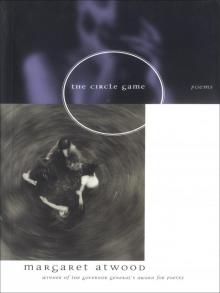 Circle Game
Circle Game Choke Collar: Positron, Episode Two
Choke Collar: Positron, Episode Two Stone Mattress: Nine Tales
Stone Mattress: Nine Tales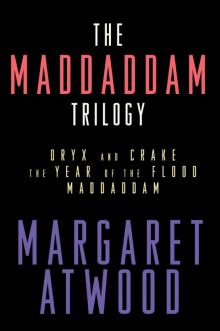 The MaddAddam Trilogy
The MaddAddam Trilogy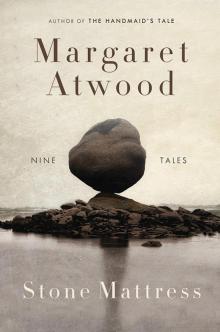 Stone Mattress
Stone Mattress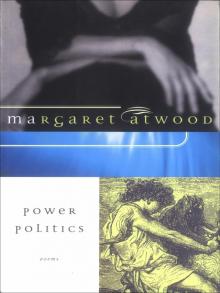 Power Politics
Power Politics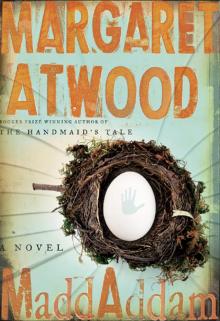 MaddAddam 03 - MaddAddam
MaddAddam 03 - MaddAddam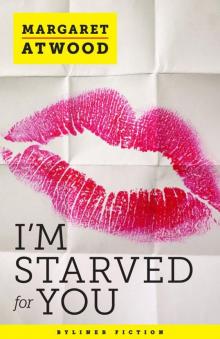 I’m Starved for You (Kindle Single)
I’m Starved for You (Kindle Single) Murder in the Dark
Murder in the Dark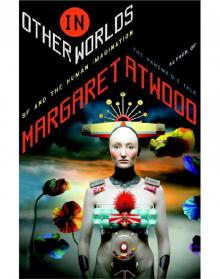 In Other Worlds
In Other Worlds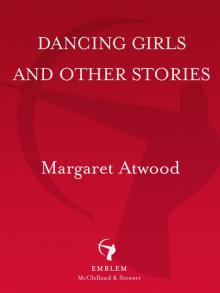 Dancing Girls
Dancing Girls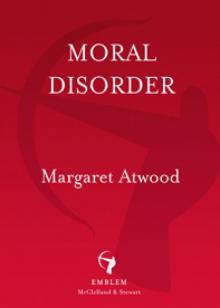 Moral Disorder
Moral Disorder